Legal Analysis: Contract and Corporation Law Case Study Solution
VerifiedAdded on 2023/01/23
|12
|1293
|48
Case Study
AI Summary
This case study analyzes two legal scenarios involving contract and corporation law. The first scenario examines an agency relationship between a company and its employee, Martin. It explores issues of vicarious liability for Martin's actions, whether the company can deny liability due to Martin's failure to follow instructions, Martin's potential liability to his employer, and whether Martin breached any laws by planning to start his own business. The second scenario involves a pre-incorporation contract made by Master Plate Pty Ltd with Irish Linen Ltd. It focuses on whether Carvers Pty Ltd can make assumptions about the contract and whether Linen Ltd can hold Master Plate liable. The analysis covers relevant contract law principles, including agency and fiduciary duty, and corporation law principles, including pre-incorporation contracts, ratification, and the doctrine of indoor management. The conclusions address the liabilities of the company and Martin in the first scenario and the rights and liabilities of the companies involved in the second scenario.
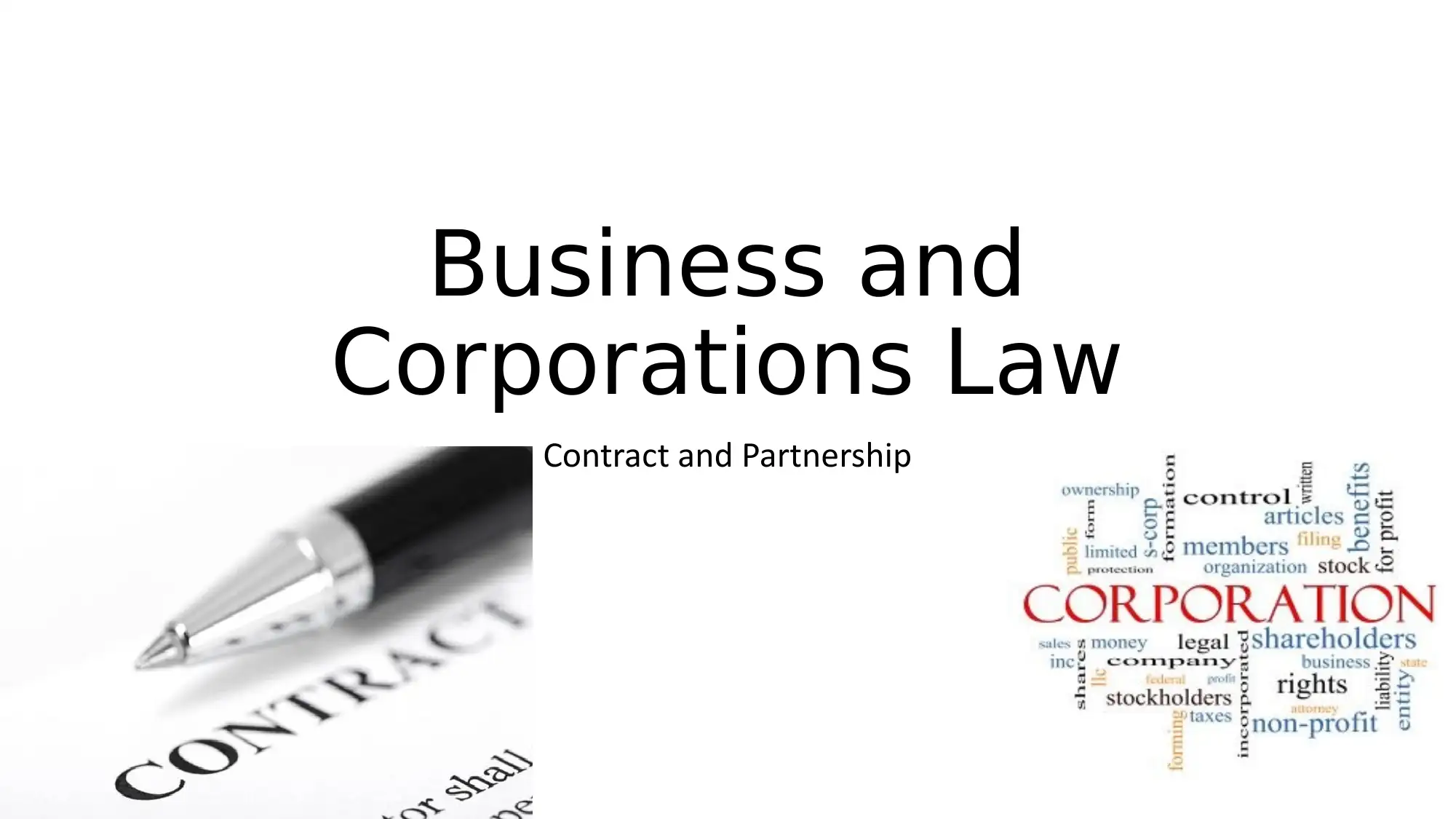
Business and
Corporations Law
Contract and Partnership
Corporations Law
Contract and Partnership
Paraphrase This Document
Need a fresh take? Get an instant paraphrase of this document with our AI Paraphraser
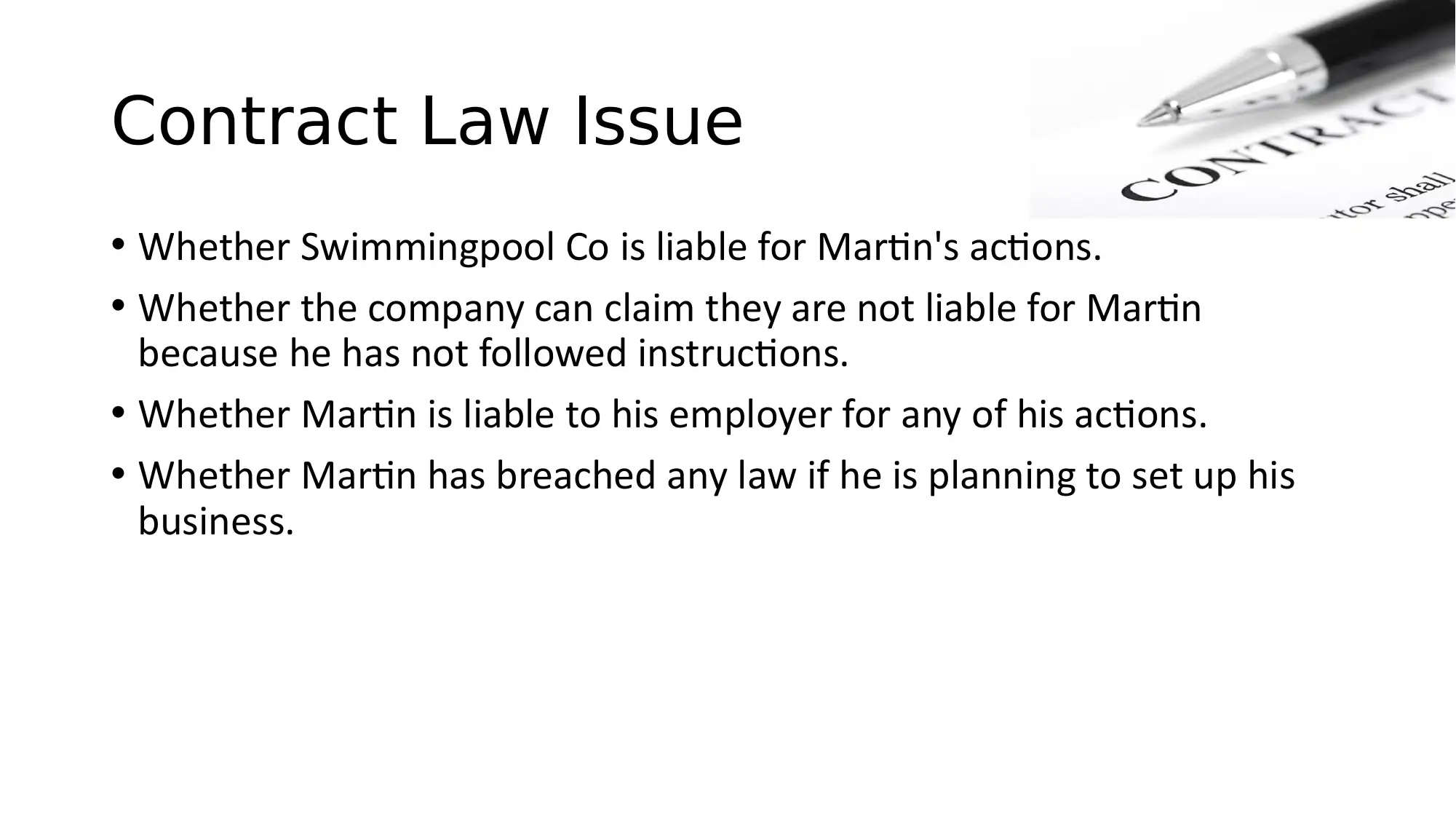
Contract Law Issue
• Whether Swimmingpool Co is liable for Martin's actions.
• Whether the company can claim they are not liable for Martin
because he has not followed instructions.
• Whether Martin is liable to his employer for any of his actions.
• Whether Martin has breached any law if he is planning to set up his
business.
• Whether Swimmingpool Co is liable for Martin's actions.
• Whether the company can claim they are not liable for Martin
because he has not followed instructions.
• Whether Martin is liable to his employer for any of his actions.
• Whether Martin has breached any law if he is planning to set up his
business.
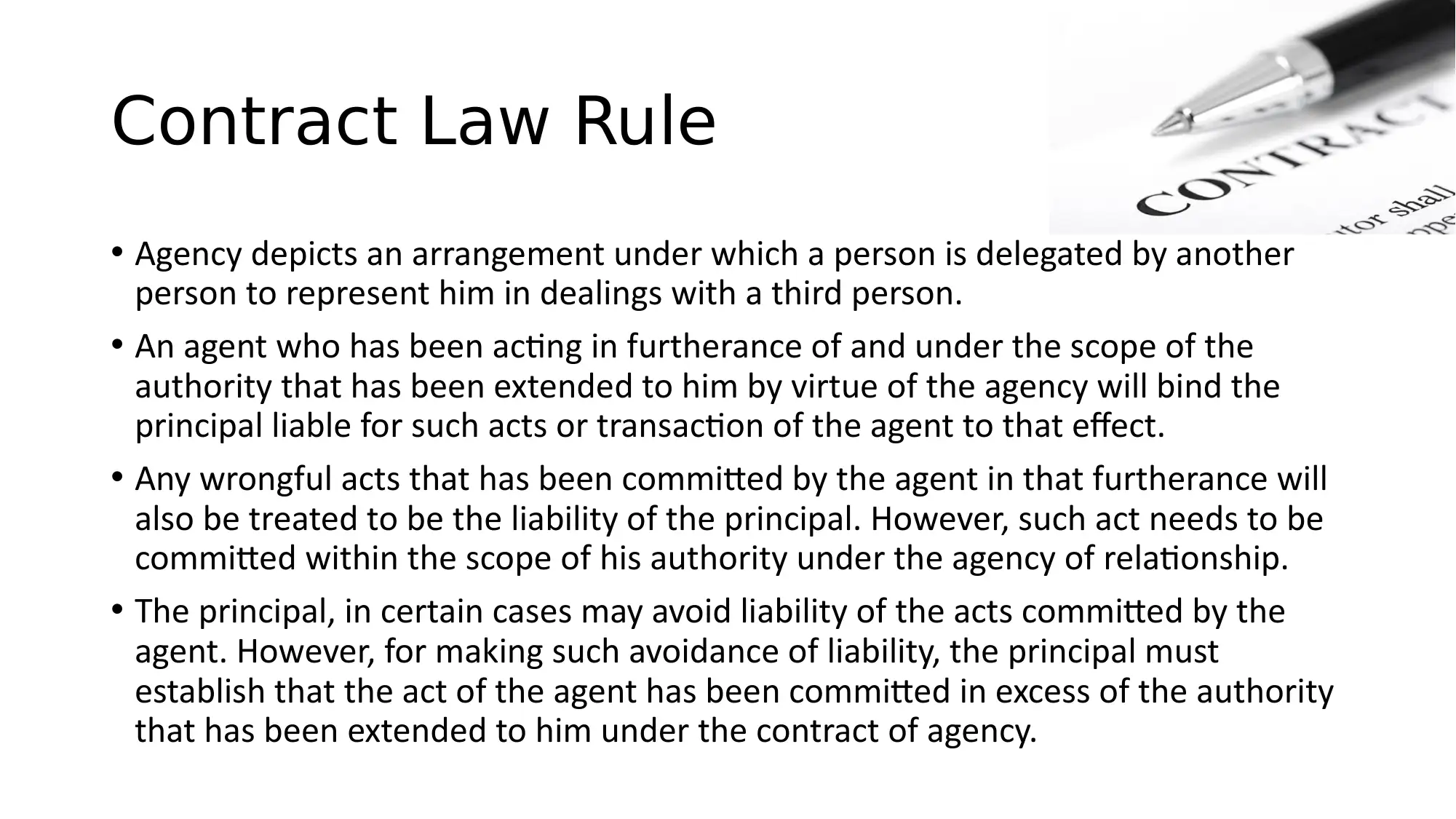
Contract Law Rule
• Agency depicts an arrangement under which a person is delegated by another
person to represent him in dealings with a third person.
• An agent who has been acting in furtherance of and under the scope of the
authority that has been extended to him by virtue of the agency will bind the
principal liable for such acts or transaction of the agent to that effect.
• Any wrongful acts that has been committed by the agent in that furtherance will
also be treated to be the liability of the principal. However, such act needs to be
committed within the scope of his authority under the agency of relationship.
• The principal, in certain cases may avoid liability of the acts committed by the
agent. However, for making such avoidance of liability, the principal must
establish that the act of the agent has been committed in excess of the authority
that has been extended to him under the contract of agency.
• Agency depicts an arrangement under which a person is delegated by another
person to represent him in dealings with a third person.
• An agent who has been acting in furtherance of and under the scope of the
authority that has been extended to him by virtue of the agency will bind the
principal liable for such acts or transaction of the agent to that effect.
• Any wrongful acts that has been committed by the agent in that furtherance will
also be treated to be the liability of the principal. However, such act needs to be
committed within the scope of his authority under the agency of relationship.
• The principal, in certain cases may avoid liability of the acts committed by the
agent. However, for making such avoidance of liability, the principal must
establish that the act of the agent has been committed in excess of the authority
that has been extended to him under the contract of agency.
⊘ This is a preview!⊘
Do you want full access?
Subscribe today to unlock all pages.

Trusted by 1+ million students worldwide
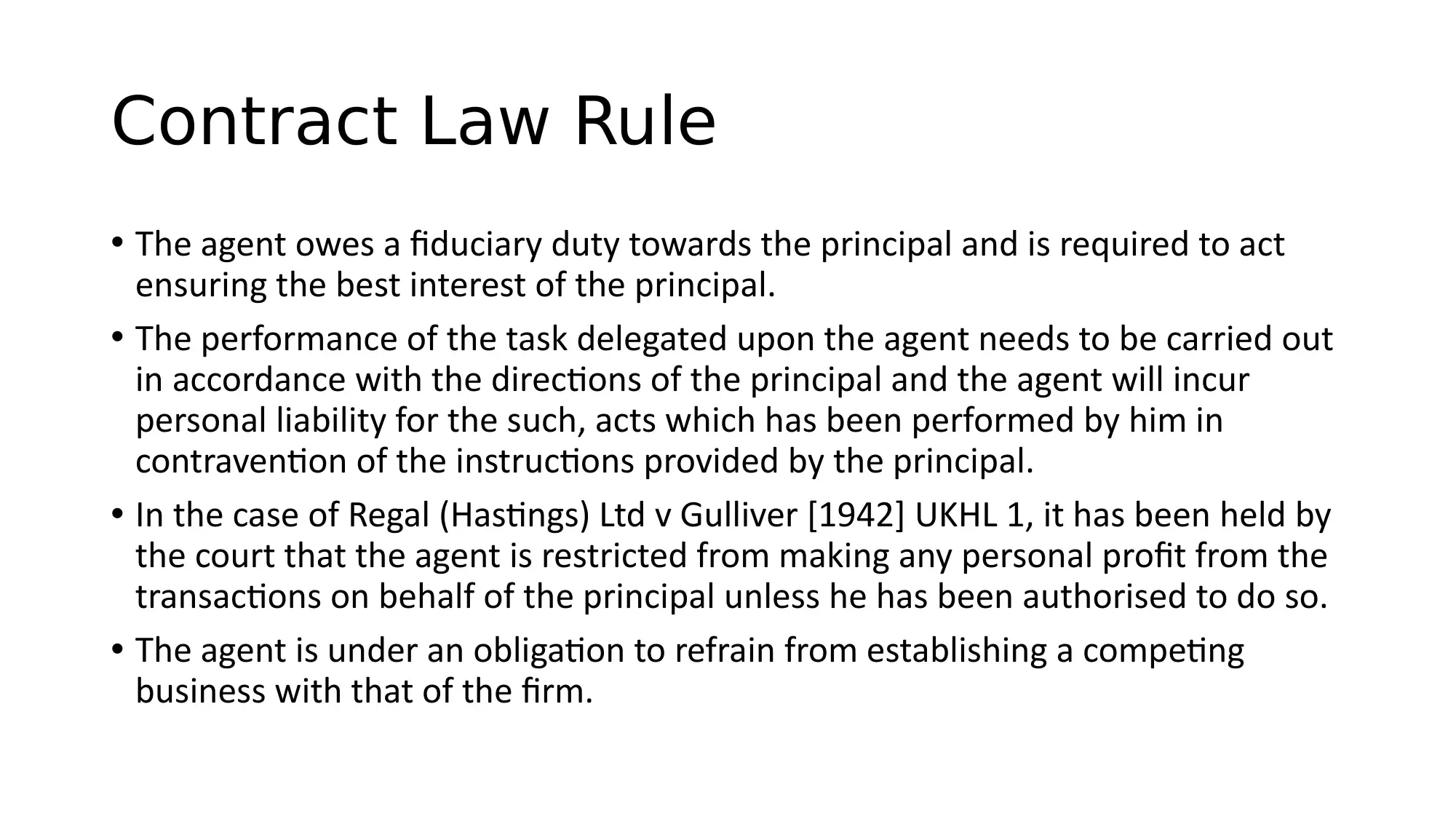
Contract Law Rule
• The agent owes a fiduciary duty towards the principal and is required to act
ensuring the best interest of the principal.
• The performance of the task delegated upon the agent needs to be carried out
in accordance with the directions of the principal and the agent will incur
personal liability for the such, acts which has been performed by him in
contravention of the instructions provided by the principal.
• In the case of Regal (Hastings) Ltd v Gulliver [1942] UKHL 1, it has been held by
the court that the agent is restricted from making any personal profit from the
transactions on behalf of the principal unless he has been authorised to do so.
• The agent is under an obligation to refrain from establishing a competing
business with that of the firm.
• The agent owes a fiduciary duty towards the principal and is required to act
ensuring the best interest of the principal.
• The performance of the task delegated upon the agent needs to be carried out
in accordance with the directions of the principal and the agent will incur
personal liability for the such, acts which has been performed by him in
contravention of the instructions provided by the principal.
• In the case of Regal (Hastings) Ltd v Gulliver [1942] UKHL 1, it has been held by
the court that the agent is restricted from making any personal profit from the
transactions on behalf of the principal unless he has been authorised to do so.
• The agent is under an obligation to refrain from establishing a competing
business with that of the firm.
Paraphrase This Document
Need a fresh take? Get an instant paraphrase of this document with our AI Paraphraser
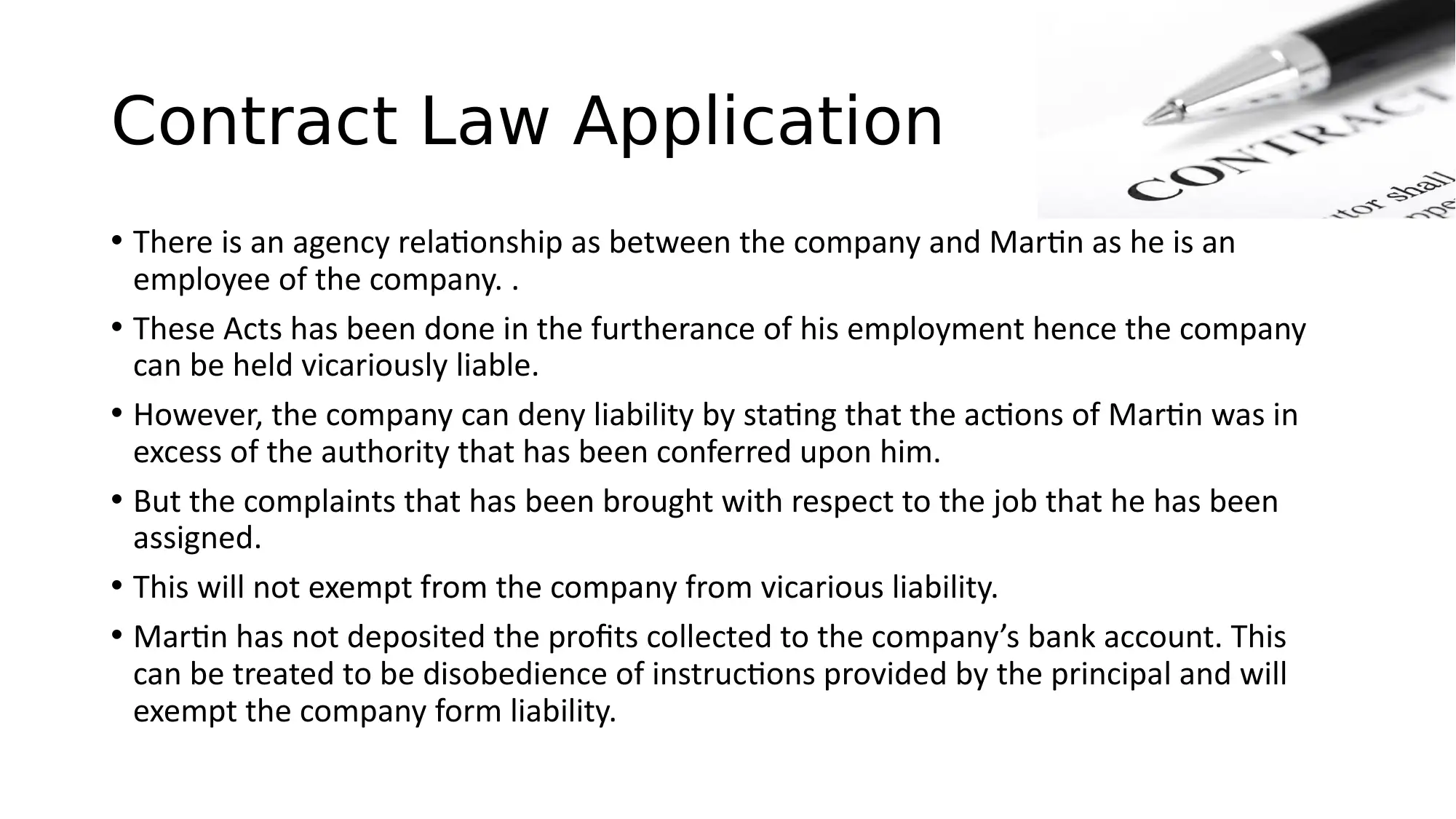
Contract Law Application
• There is an agency relationship as between the company and Martin as he is an
employee of the company. .
• These Acts has been done in the furtherance of his employment hence the company
can be held vicariously liable.
• However, the company can deny liability by stating that the actions of Martin was in
excess of the authority that has been conferred upon him.
• But the complaints that has been brought with respect to the job that he has been
assigned.
• This will not exempt from the company from vicarious liability.
• Martin has not deposited the profits collected to the company’s bank account. This
can be treated to be disobedience of instructions provided by the principal and will
exempt the company form liability.
• There is an agency relationship as between the company and Martin as he is an
employee of the company. .
• These Acts has been done in the furtherance of his employment hence the company
can be held vicariously liable.
• However, the company can deny liability by stating that the actions of Martin was in
excess of the authority that has been conferred upon him.
• But the complaints that has been brought with respect to the job that he has been
assigned.
• This will not exempt from the company from vicarious liability.
• Martin has not deposited the profits collected to the company’s bank account. This
can be treated to be disobedience of instructions provided by the principal and will
exempt the company form liability.
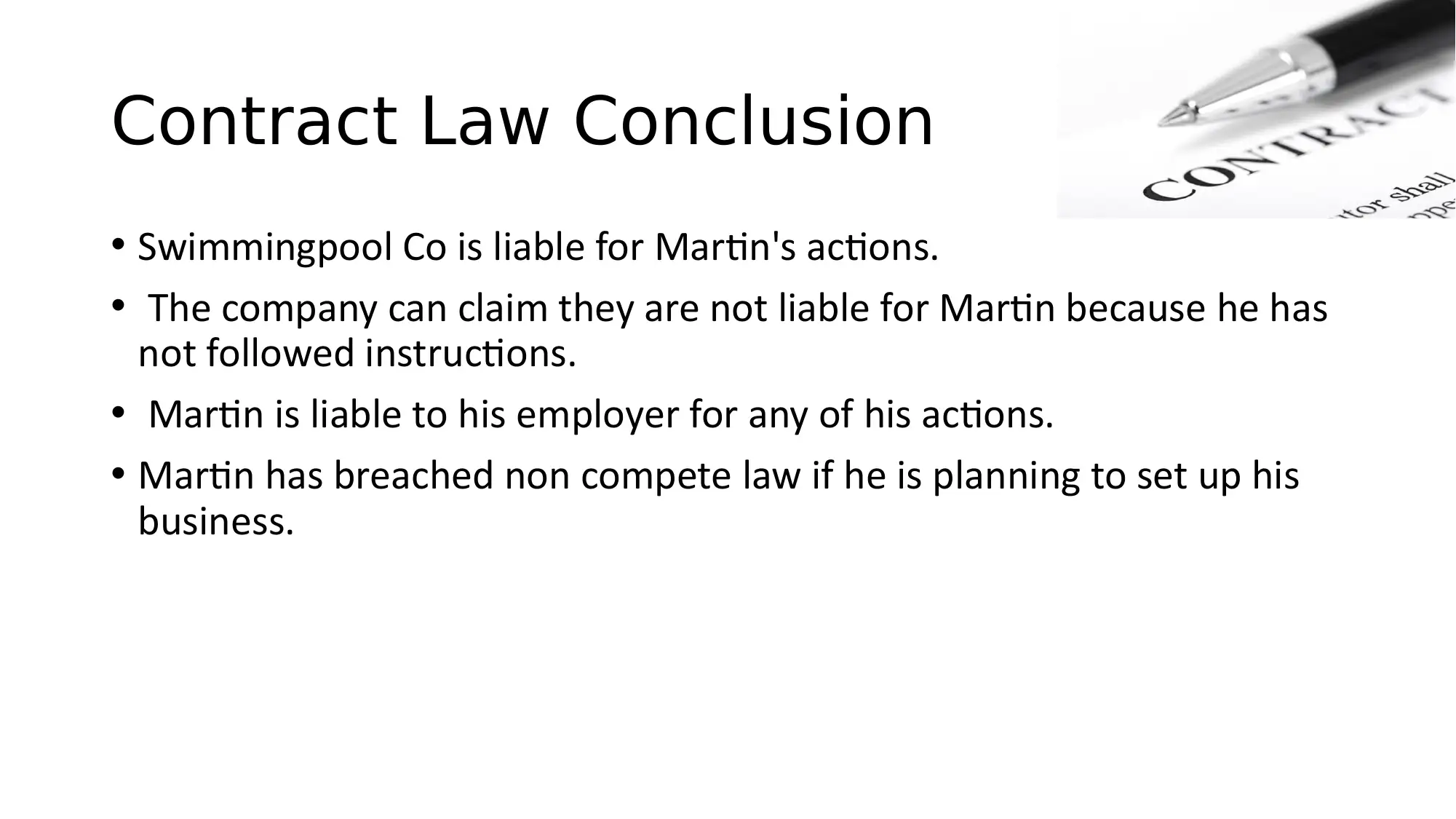
Contract Law Conclusion
• Swimmingpool Co is liable for Martin's actions.
• The company can claim they are not liable for Martin because he has
not followed instructions.
• Martin is liable to his employer for any of his actions.
• Martin has breached non compete law if he is planning to set up his
business.
• Swimmingpool Co is liable for Martin's actions.
• The company can claim they are not liable for Martin because he has
not followed instructions.
• Martin is liable to his employer for any of his actions.
• Martin has breached non compete law if he is planning to set up his
business.
⊘ This is a preview!⊘
Do you want full access?
Subscribe today to unlock all pages.

Trusted by 1+ million students worldwide
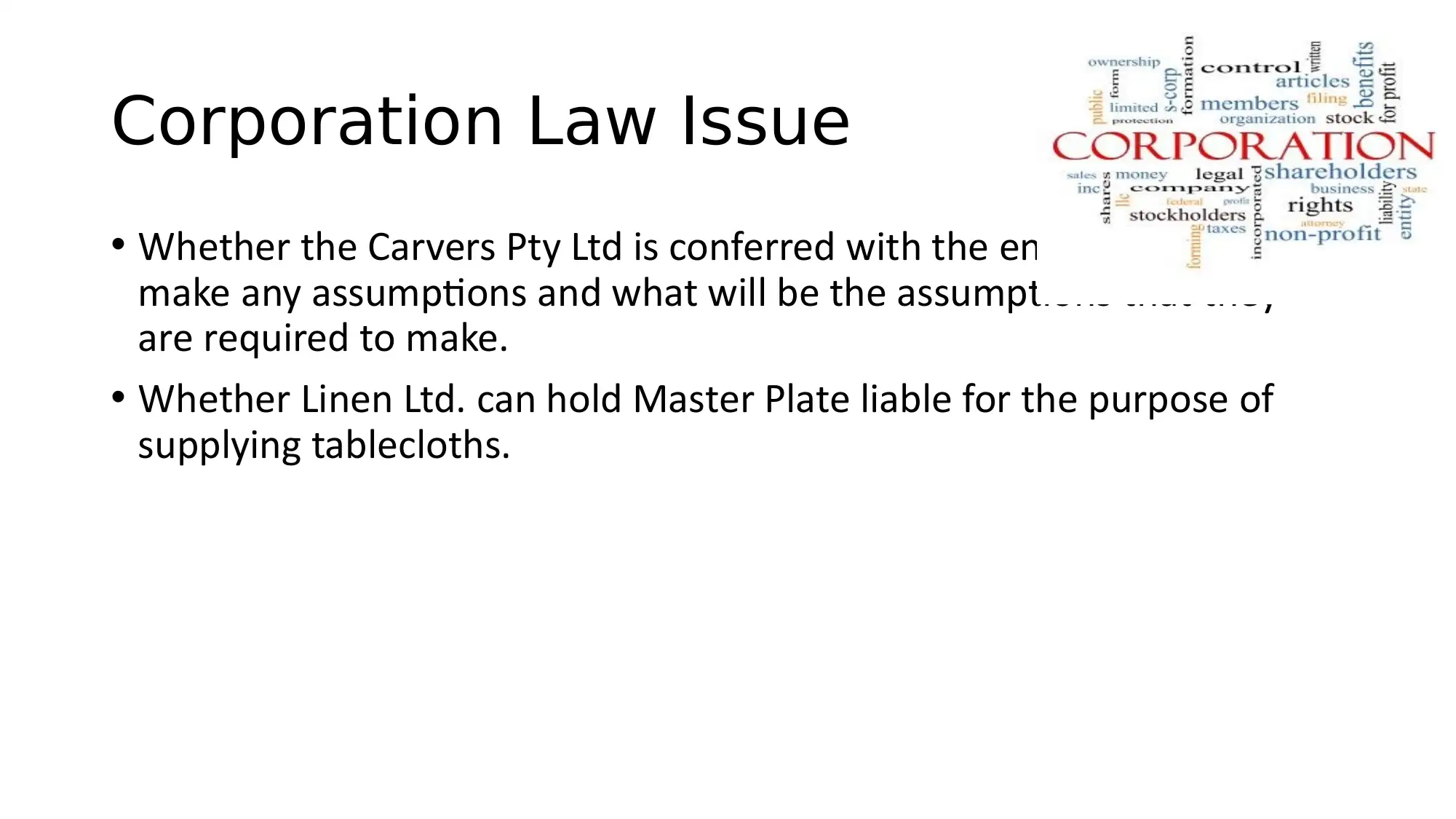
Corporation Law Issue
• Whether the Carvers Pty Ltd is conferred with the entitlement to
make any assumptions and what will be the assumptions that they
are required to make.
• Whether Linen Ltd. can hold Master Plate liable for the purpose of
supplying tablecloths.
• Whether the Carvers Pty Ltd is conferred with the entitlement to
make any assumptions and what will be the assumptions that they
are required to make.
• Whether Linen Ltd. can hold Master Plate liable for the purpose of
supplying tablecloths.
Paraphrase This Document
Need a fresh take? Get an instant paraphrase of this document with our AI Paraphraser
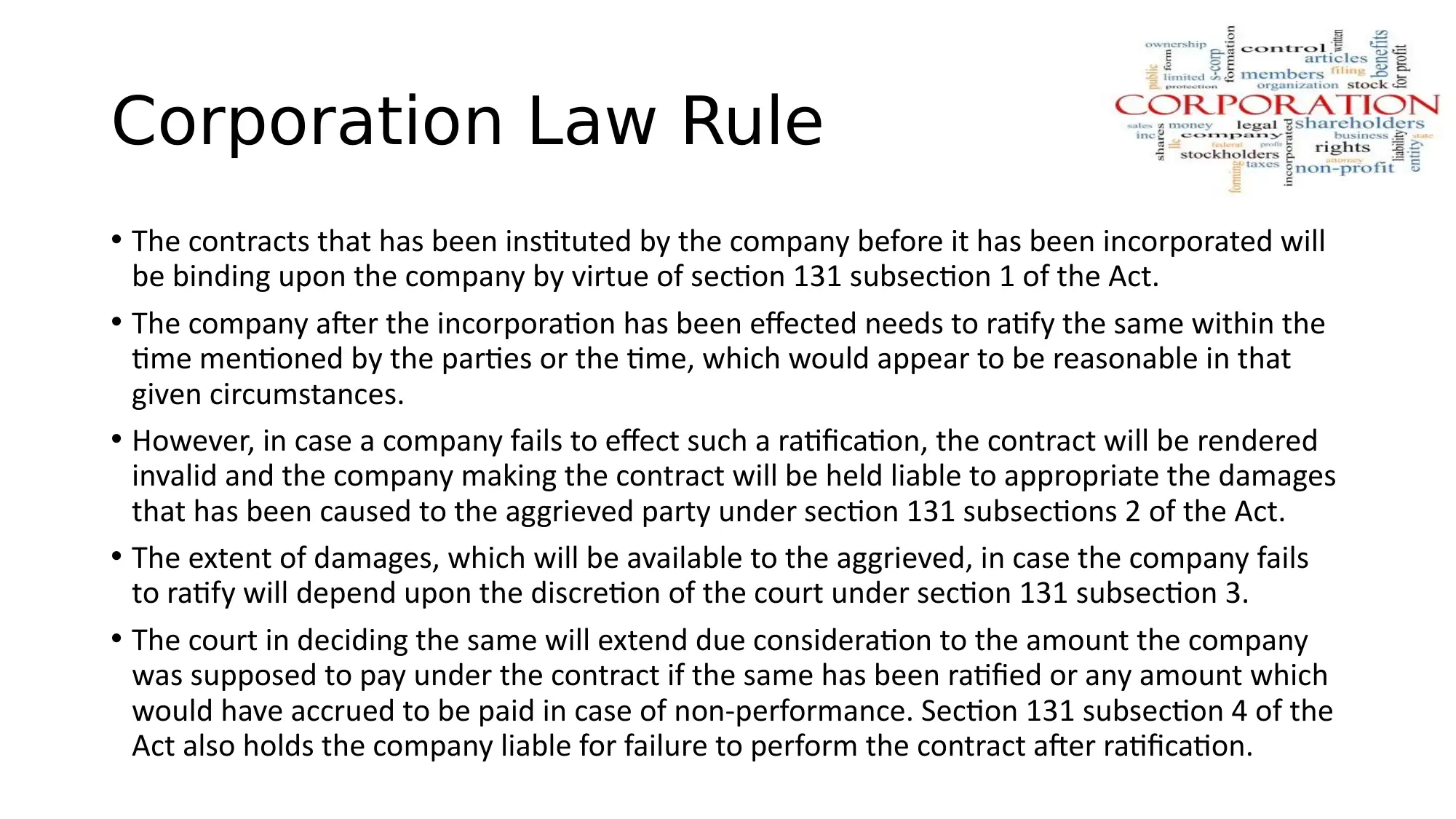
Corporation Law Rule
• The contracts that has been instituted by the company before it has been incorporated will
be binding upon the company by virtue of section 131 subsection 1 of the Act.
• The company after the incorporation has been effected needs to ratify the same within the
time mentioned by the parties or the time, which would appear to be reasonable in that
given circumstances.
• However, in case a company fails to effect such a ratification, the contract will be rendered
invalid and the company making the contract will be held liable to appropriate the damages
that has been caused to the aggrieved party under section 131 subsections 2 of the Act.
• The extent of damages, which will be available to the aggrieved, in case the company fails
to ratify will depend upon the discretion of the court under section 131 subsection 3.
• The court in deciding the same will extend due consideration to the amount the company
was supposed to pay under the contract if the same has been ratified or any amount which
would have accrued to be paid in case of non-performance. Section 131 subsection 4 of the
Act also holds the company liable for failure to perform the contract after ratification.
• The contracts that has been instituted by the company before it has been incorporated will
be binding upon the company by virtue of section 131 subsection 1 of the Act.
• The company after the incorporation has been effected needs to ratify the same within the
time mentioned by the parties or the time, which would appear to be reasonable in that
given circumstances.
• However, in case a company fails to effect such a ratification, the contract will be rendered
invalid and the company making the contract will be held liable to appropriate the damages
that has been caused to the aggrieved party under section 131 subsections 2 of the Act.
• The extent of damages, which will be available to the aggrieved, in case the company fails
to ratify will depend upon the discretion of the court under section 131 subsection 3.
• The court in deciding the same will extend due consideration to the amount the company
was supposed to pay under the contract if the same has been ratified or any amount which
would have accrued to be paid in case of non-performance. Section 131 subsection 4 of the
Act also holds the company liable for failure to perform the contract after ratification.
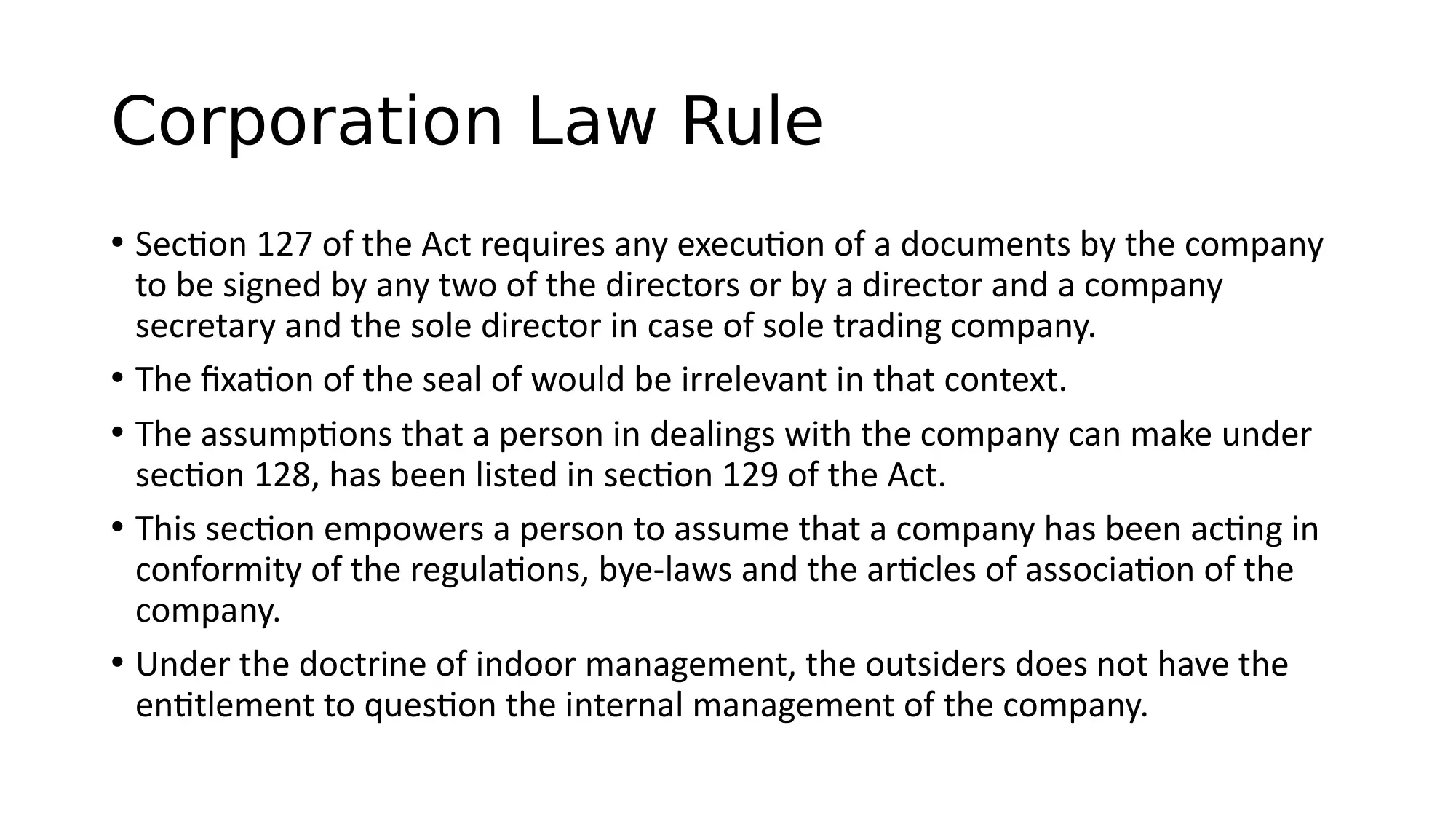
Corporation Law Rule
• Section 127 of the Act requires any execution of a documents by the company
to be signed by any two of the directors or by a director and a company
secretary and the sole director in case of sole trading company.
• The fixation of the seal of would be irrelevant in that context.
• The assumptions that a person in dealings with the company can make under
section 128, has been listed in section 129 of the Act.
• This section empowers a person to assume that a company has been acting in
conformity of the regulations, bye-laws and the articles of association of the
company.
• Under the doctrine of indoor management, the outsiders does not have the
entitlement to question the internal management of the company.
• Section 127 of the Act requires any execution of a documents by the company
to be signed by any two of the directors or by a director and a company
secretary and the sole director in case of sole trading company.
• The fixation of the seal of would be irrelevant in that context.
• The assumptions that a person in dealings with the company can make under
section 128, has been listed in section 129 of the Act.
• This section empowers a person to assume that a company has been acting in
conformity of the regulations, bye-laws and the articles of association of the
company.
• Under the doctrine of indoor management, the outsiders does not have the
entitlement to question the internal management of the company.
⊘ This is a preview!⊘
Do you want full access?
Subscribe today to unlock all pages.

Trusted by 1+ million students worldwide
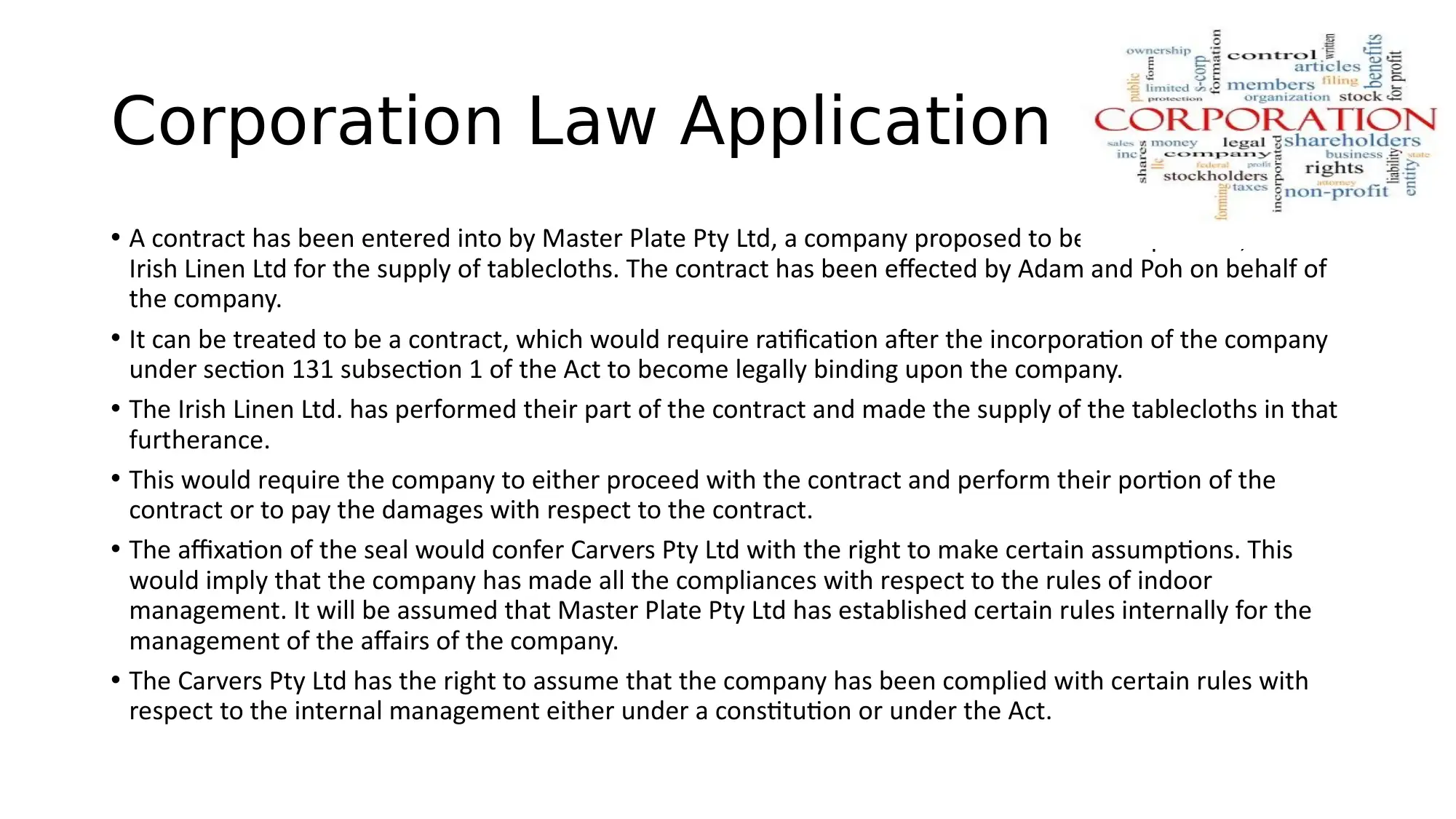
Corporation Law Application
• A contract has been entered into by Master Plate Pty Ltd, a company proposed to be incorporated, with
Irish Linen Ltd for the supply of tablecloths. The contract has been effected by Adam and Poh on behalf of
the company.
• It can be treated to be a contract, which would require ratification after the incorporation of the company
under section 131 subsection 1 of the Act to become legally binding upon the company.
• The Irish Linen Ltd. has performed their part of the contract and made the supply of the tablecloths in that
furtherance.
• This would require the company to either proceed with the contract and perform their portion of the
contract or to pay the damages with respect to the contract.
• The affixation of the seal would confer Carvers Pty Ltd with the right to make certain assumptions. This
would imply that the company has made all the compliances with respect to the rules of indoor
management. It will be assumed that Master Plate Pty Ltd has established certain rules internally for the
management of the affairs of the company.
• The Carvers Pty Ltd has the right to assume that the company has been complied with certain rules with
respect to the internal management either under a constitution or under the Act.
• A contract has been entered into by Master Plate Pty Ltd, a company proposed to be incorporated, with
Irish Linen Ltd for the supply of tablecloths. The contract has been effected by Adam and Poh on behalf of
the company.
• It can be treated to be a contract, which would require ratification after the incorporation of the company
under section 131 subsection 1 of the Act to become legally binding upon the company.
• The Irish Linen Ltd. has performed their part of the contract and made the supply of the tablecloths in that
furtherance.
• This would require the company to either proceed with the contract and perform their portion of the
contract or to pay the damages with respect to the contract.
• The affixation of the seal would confer Carvers Pty Ltd with the right to make certain assumptions. This
would imply that the company has made all the compliances with respect to the rules of indoor
management. It will be assumed that Master Plate Pty Ltd has established certain rules internally for the
management of the affairs of the company.
• The Carvers Pty Ltd has the right to assume that the company has been complied with certain rules with
respect to the internal management either under a constitution or under the Act.
Paraphrase This Document
Need a fresh take? Get an instant paraphrase of this document with our AI Paraphraser
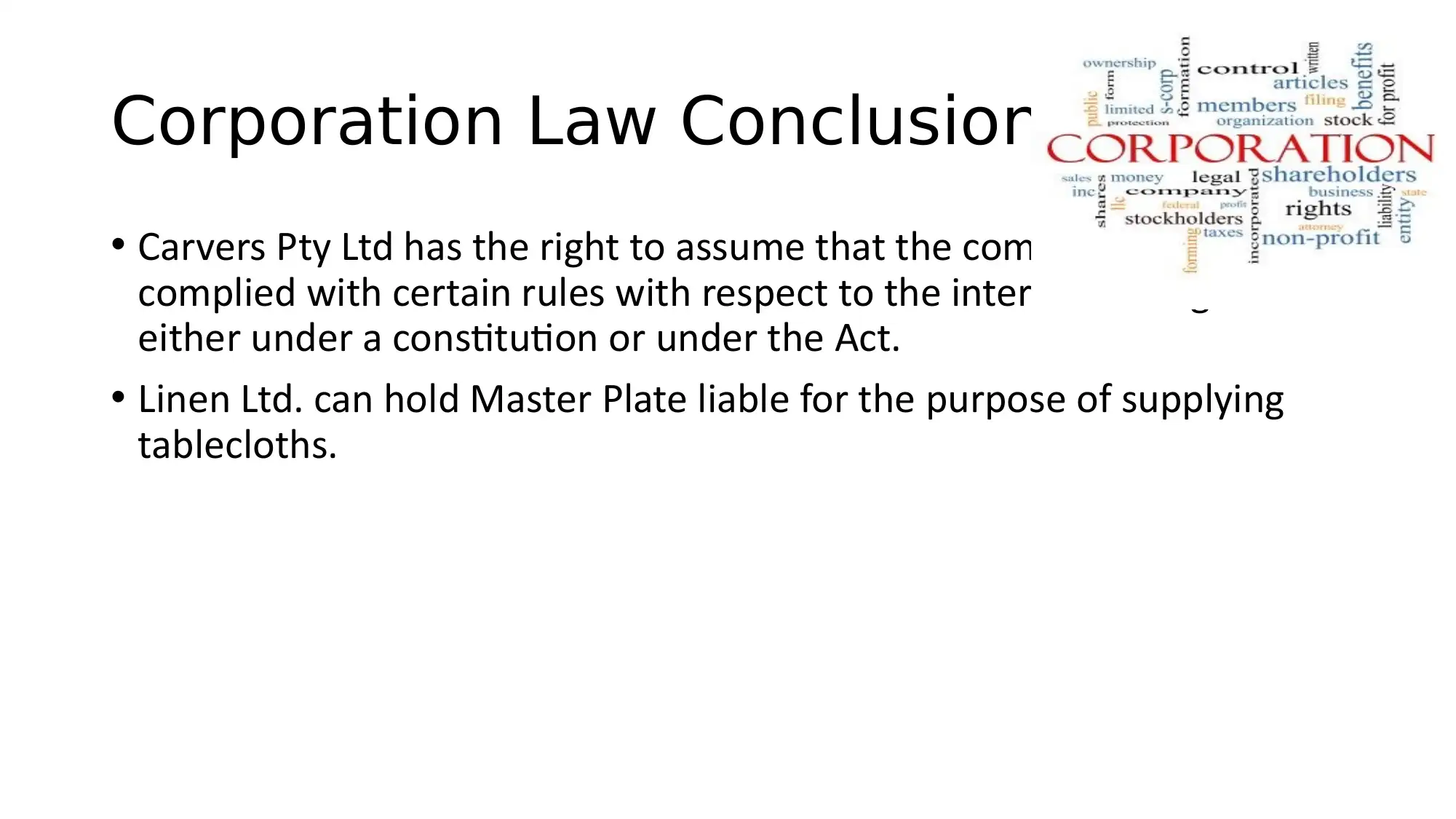
Corporation Law Conclusion
• Carvers Pty Ltd has the right to assume that the company has been
complied with certain rules with respect to the internal management
either under a constitution or under the Act.
• Linen Ltd. can hold Master Plate liable for the purpose of supplying
tablecloths.
• Carvers Pty Ltd has the right to assume that the company has been
complied with certain rules with respect to the internal management
either under a constitution or under the Act.
• Linen Ltd. can hold Master Plate liable for the purpose of supplying
tablecloths.

⊘ This is a preview!⊘
Do you want full access?
Subscribe today to unlock all pages.

Trusted by 1+ million students worldwide
1 out of 12
Related Documents
Your All-in-One AI-Powered Toolkit for Academic Success.
+13062052269
info@desklib.com
Available 24*7 on WhatsApp / Email
![[object Object]](/_next/static/media/star-bottom.7253800d.svg)
Unlock your academic potential
Copyright © 2020–2026 A2Z Services. All Rights Reserved. Developed and managed by ZUCOL.





